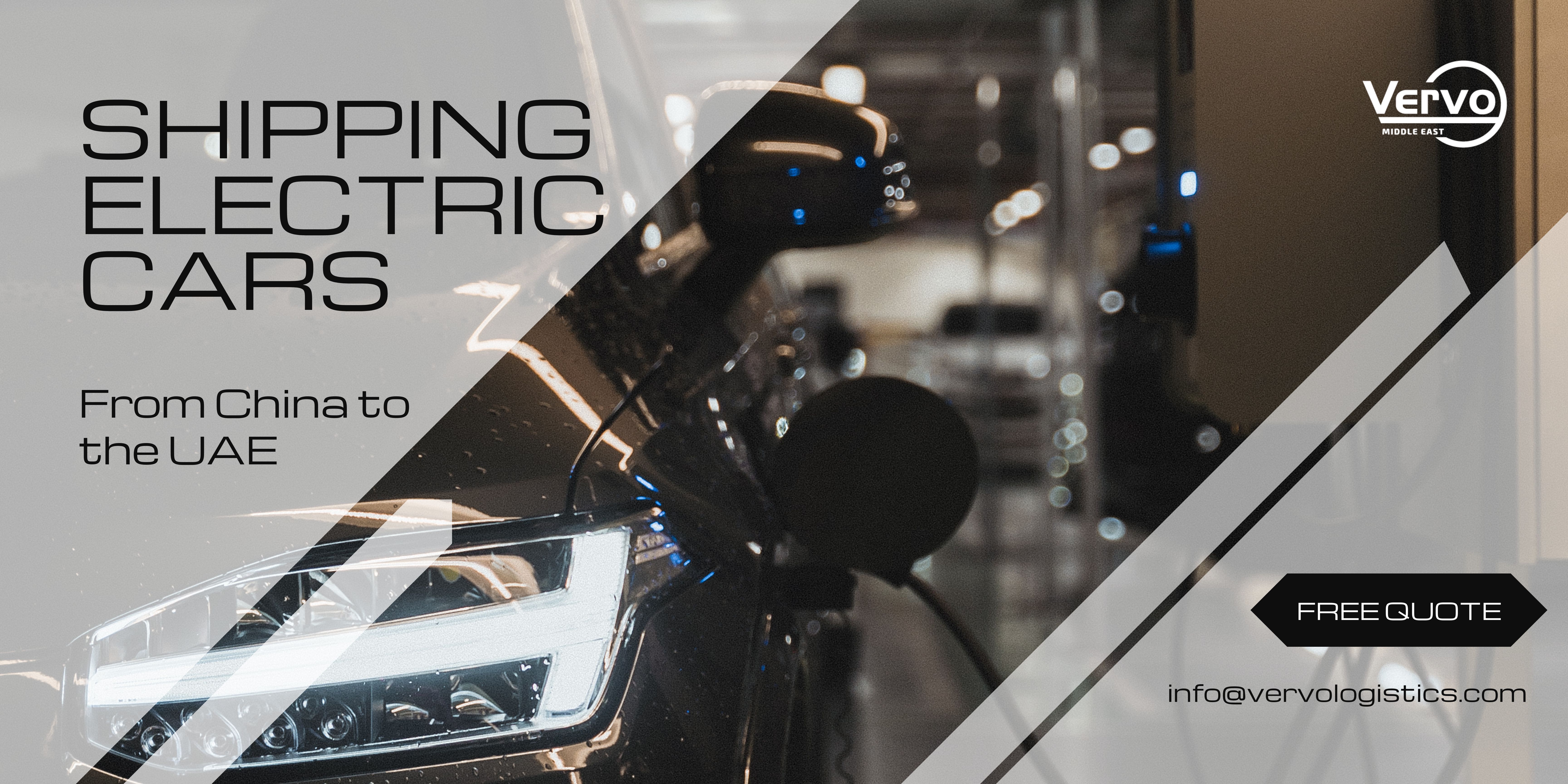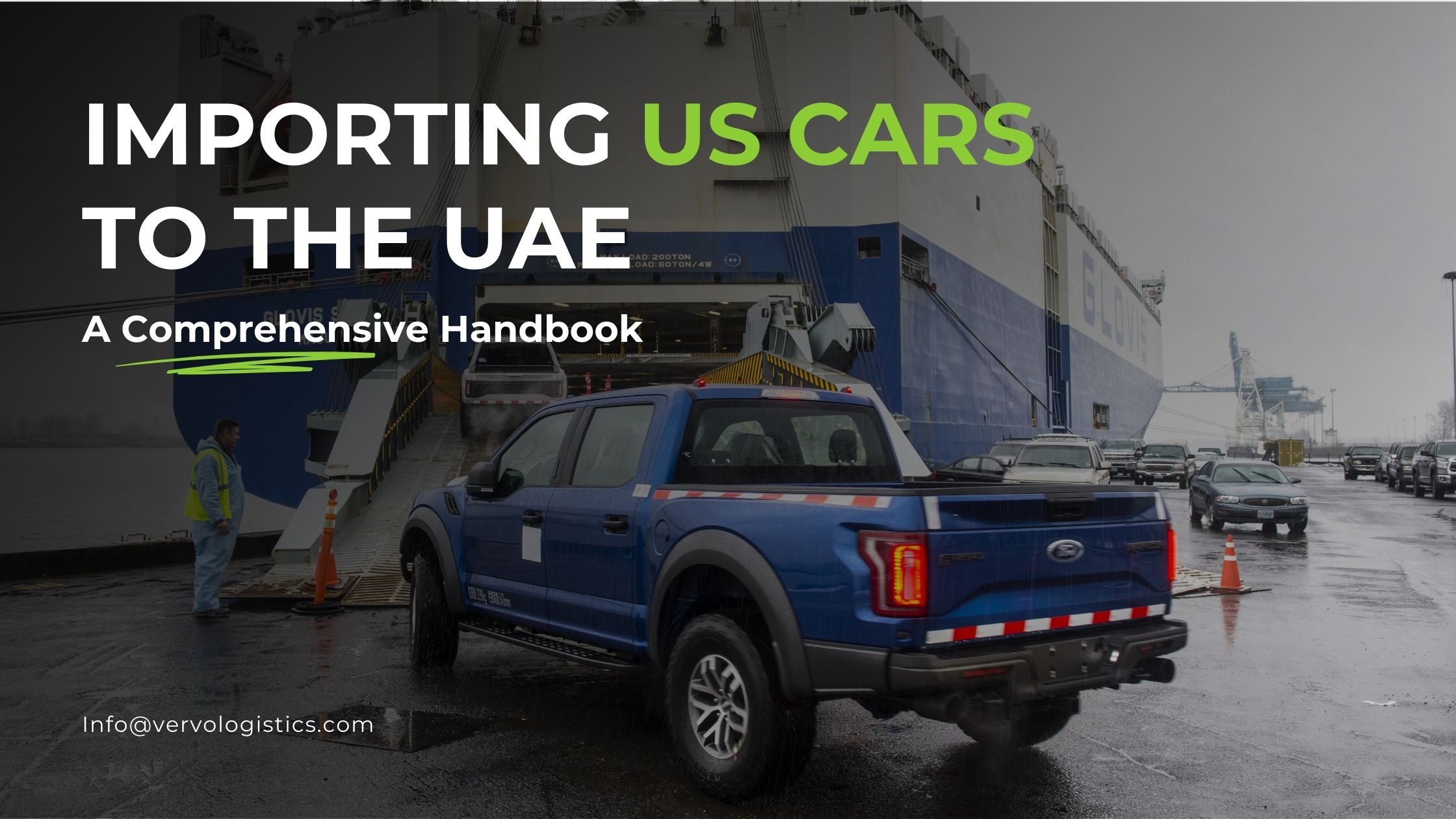The global shift towards electric vehicles (EVs) is not just a trend; it's a crucial part of the world journey towards sustainable transportation. China, leading the charge, has become a major hub for EV manufacturing. Simultaneously, the United Arab Emirates, with its focus on innovative technologies and sustainable practices, is rapidly becoming a prime market for these vehicles. But shipping electric cars to the UAE is still complicated to some shippers. This post delves into the intricate process of shipping EVs from China to the UAE, covering the main logistical steps we go through, including:
✔️Shipping Methods
✔️Route Planning
✔️Factors Affecting Route Selection
✔️Documentations and Regulations Required
Shipping Methods: Choosing Between Sea Freight and Air Freight
When it comes to shipping electric vehicles (EVs) from China to the United Arab Emirates, the choice between sea freight and air freight is dictated not just by speed, but significantly by cost-effectiveness.
Air Freight: Fast but Costly
- Speed vs. Expense: Air freight stands out for its rapid transit times, capable of delivering shipments within a minimal 1-2 days and at most 5 days. However, this swiftness comes with a significant price tag.
- The Cost-Benefit Calculations: In the case of shipping EVs, the cost of transporting a car by air can often exceed the vehicle's own value. This stark cost disparity makes air freight a less feasible option for most EV shipments, reserved only for extremely time-sensitive or high-priority deliveries where budget is not a constraint.
Sea Freight: The Preferred Method for Cost Efficiency
- Slower but Economical: Sea freight, though slower in pace, is often the preferred choice for shipping EVs. This preference stems from its notable cost-effectiveness, making it a viable option for large-scale shipments or for those where time is not a pressing factor.
- Route Optimization: The selection of sea freight also influences the specific route taken. The focus here is to balance efficiency with cost—choosing a route that offers safe and timely delivery at a reasonable price.
Next, we will navigate the process of choosing the exact route via ocean freight. That is because sea freight remains the go-to option for its balance of efficiency and economic viability.
Mapping the Shipping Route For EVs from China to the UAE
Each route is chosen based on a matrix of factors that ensure efficiency, cost-effectiveness, and safety.
Major Shipping Ports in China:
The journey begins at some of China's largest ports, such as:
- Shanghai Port: The busiest port in the world in terms of container traffic.
- Shenzhen Port: One of the fastest-growing ports in southern China.
- Ningbo-Zhoushan Port: Known for its deep-water port and massive cargo capacity.
Other bustling ports of Guangzhou and Hong Kong also serve as the primary gateways for EV exports. These ports are not just transit points but sophisticated logistics centers, equipped to handle the unique requirements of EVs, including their sensitive battery components, to ensure seamless handling.
Key Destinations in the UAE
Upon reaching the UAE, the Port of Jebel Ali and Zayed Port serve as key destinations for receiving these shipments. Jebel Ali, the largest marine terminal in the Middle East and the ninth busiest in the world, and Zayed Port, a major commercial seaport in Abu Dhabi, are well-equipped to handle the influx of electric vehicles, ensuring their safe and efficient offloading and distribution. Jabal Ali alone offers connections to over 150 ports globally, making it a pivotal node in the EV shipping network. Other destinations include:
- Port of Khalifa (Abu Dhabi): A deep-sea port that caters to large cargo vessels.
- Port of Sharjah: Known for its strategic location and versatile cargo handling capabilities.
The most direct maritime route from China to the UAE typically involves crossing the South China Sea, passing through the Strait of Malacca, navigating the Indian Ocean, and entering the Arabian Gulf. However, the choice of the exact route can vary based on several factors.
Factors Affecting EVs Sea Route Selection
Selecting the optimal shipping route for EVs from China to the UAE involves a complex evaluation of port capabilities, transit times, cost, and adherence to regulatory standards. It's a delicate balance between ensuring the shortest possible transit time, minimizing costs, maintaining safety standards, and dealing with the unpredictable aspects of maritime shipping.
- Distance and Transit Time:
The average sea cargo journey from China to the UAE spans 10–14 days. That is, port-to-port delivery takes a maximum of 25 days and a minimum of 20 days, while door-to-door delivery takes from 35 to 43 days by sea. Route selection here hinges on minimizing transit time while ensuring safety and reliability. The shorter the distance, the less time and fuel the journey requires. We favor choosing the most direct routes. However, congestion, especially in narrow waterways like the Strait of Malacca, can sometimes make longer routes more appealing. Options for expedited shipping are available, albeit at a higher cost.
- Cost Factors:
Besides the distance, other costs associated with the route must be considered. These include canal fees, port charges, and fuel costs. Additionally, the cost of potential delays due to congestion or adverse weather should also be taken into account. You can take a look at the other cost factors involved in our ultimate guide for car shipping costs to the UAE.
- Battery Safety and Regulations:
Lithium-ion batteries, which power the majority of EVs, are classified as dangerous goods by the International Maritime Dangerous Goods (IMDG) Code due to their flammability. As a result, certain ports and shipping lines may have restrictions or special requirements for handling these goods, which can influence the choice of route. It's important to select a route that adheres to all safety regulations and has the necessary facilities for handling dangerous goods.
- Special Handling Requirements:
EVs often require special handling due to their high value and sensitivity of components. Therefore, the route must involve ports with the necessary handling and storage capabilities. This may include climate-controlled storage, advanced handling equipment, and skilled logistics specialists trained in EV handling.
- Insurance Costs:
Given the high value of EVs and their batteries, insurance costs can be a significant consideration. Routes with a history of fewer incidents or better safety records might be preferred to keep these costs down. Get to know more about the insurance and liability for UAE car shipping in our expert guide.
- Potential for Roll-On/Roll-Off (RoRo) Shipping
RoRo shipping, where vehicles are driven on and off the ship, is often preferred for EVs as it reduces the risk of damage during loading and unloading. Therefore, the availability of RoRo services at the time of shipping could influence the choice of route. RoRo Shipping isn't the only shipping solution available to move cars across countries, but it is the most common way. Other shipping solutions available for car shipping in the UAE include container shipping.
- Environmental and Seasonal Factors:
Shipping routes are also selected based on environmental considerations and weather conditions. Storms, high waves, and other adverse conditions can slow down travel or make certain routes dangerous. Thus, we consider seasonal weather patterns when planning the shipping route. Other factors, like political stability, are also considered.
As with any shipping decision, the choice of route for shipping EVs is a complex one that requires balancing many factors. The relative importance of these factors can vary based on the specific requirements of the shipper and the characteristics of the EVs being transported. It's always recommended to work closely with experienced logistics providers, like Vervo Middle East, as we expertly plan the most efficient and safe route. Check out here how car shipping works with Vervo Middle East.
Customs and Regulations for Shipping EVs from China to Dubai:
Delays in customs due to inadequate documentation or non-compliance can significantly disrupt schedules and inflate costs. We ensure compliance with the UAE's specific import regulations, and all customs requirements are meticulously met. That is critical to avoid delays and additional costs. Proper documentation, including a commercial invoice, packing list, and certificate of origin, is essential for a smooth process. That is a detailed view of documents you need to ship a car into the UAE. And below is a summary of documents and fees needed to move EVs from China to the UAE:
China Export Regulations
- For Traders: On the export side, the necessary documents typically include a commercial invoice, a packing list, an export license, and a customs declaration. All goods exported from China must pass through customs export procedures. The freight forwarder must submit a declaration to the customs authority. As with imports, certain goods may require specific export licenses or are subject to other regulations. For instance, lithium-ion batteries have specific shipping requirements and restrictions due to their classification as dangerous goods.
- For Personal Use: Documents may include a bill of lading, invoice, shipping list, customs declaration, insurance policy, sales contract, and potentially more specialized documents like an import quota certificate for general commodities, an inspection certificate, and other safety or quality licenses where applicable.
UAE Import Regulations
- For Traders: To import goods into the UAE, companies must possess the correct trade license from the Department of Economic Development (DED) of the respective emirate. Standard trade documentation required includes an import permit for restricted or duty-exempted goods, a detailed packing list including weight, method of packing, and HS code for each item, a certificate of origin, a bill of entry or airway bill, and a commercial invoice.
- For Personal Use: To import and EV into the UAE, we provide a delivery order, a bill of lading or airway bill, a packing list, and an original invoice attested by the chamber of commerce in the country of origin. When importing a car to Dubai, a customs duty of 5% is applied. This is calculated on the combined total of the vehicle's value, 1% insurance, and the cost of shipment. Additionally, a value-added tax (VAT) of 5% is levied on the CIF (Cost, Insurance, and Freight) value, covering all cost elements.
Considerations for Vehicle Import into the UAE
✔️Exemptions for Older Vehicles: Vehicles over 21 years old with original engines may be exempt from EPA regulations. And vehicles older than 25 years might qualify for DOT exemptions. If you are not familiar with these abbreviations, check the incoterms you need to know before shipping to the UAE.
✔️Vehicle Cleanliness: The car's undercarriage must be thoroughly cleaned using steam-spraying before shipping to the UAE.
✔️Compliance Labels and Documentation: Compliant vehicles will display a manufacturer's label in the engine compartment for emissions standards and a certification label near the driver's side door for safety and other standards, all in English. Necessary forms include EPA Form 3520-1 and DOT Form HS-7, along with original bills of lading, bill of sale, foreign registration, and other pertinent documents for CBP inspection.
Remember, it is okay to take your time to choose a car shipping service that fits your needs; because any slight slip can break the bank.
At Vervo Middle East, we help you determine the eligibility of your EVs before moving them and how to ship them if they are not eligible. Our team of logistics specialists ensures a smooth delivery of your EV(s) from China to Dubai. Send us your electric car details; like the unloading and loading locations, EV information and model, and your preferences, and receive a FREE customized shipping quote in 60 minutes!
☎️ +971508723352 | 📧




.png)